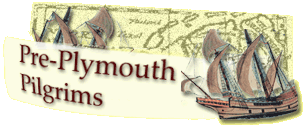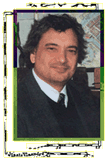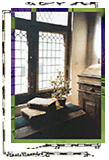 |
 |
 |
|
|||

Pre-Plymouth Pilgrims If you stand in front of the clock tower on Leiden's Beschuitsteeg -- or Biscuit Street -- you might notice a small sign on an ancient building that reads: "The Leiden American Pilgrim Museum." 
Inside, American historian Jeremy Bangs is showing a group of Dutch and American tourists around the tiny one-room residence. It's dark inside; the only light comes from candles and the bit of daylight that makes it through the heavy leaded glass windows. Bangs says this is the type of dwelling Pilgrim leaders would have lived in during their long stopover in Holland en route to America.
Bangs is the former chief curator at Plimoth Plantation in Massachusetts. He has spent most of his life studying this group of religious dissidents who first left the Church of England and then left England itself for what they hoped was a more tolerant place: Holland. Leiden was a university town with a large refugee population. But by 1620, the Pilgrims were afraid of Dutch assimilation and looked for another home. Later that year, one hundred of them arrived in the New World. It was too late to build proper homes, so they lived together on the Mayflower in extremely close quarters. Half the group died. Some of the relatives of the less fortunate passengers of the Mayflower remained in Holland. Some of their descendants still live in Leiden today. The Pilgrim Museum has a remarkable collection of buttons, buckles, tools, and toys of the era. 
Children would play with the marbles on a special tray with compartments.

The tiny museum attracts about three thousand visitors a year, both Americans and locals like Dutch English teacher Eva von Santen. Von Santen says it took a classic novel to spark her students' interest in Leiden's role in America's beginnings.
Because the museum is so tiny, Bangs provides a map so that overflow tourists can explore other Pilgrim connections in nearby streets. But American visitor Heather Ryan says it's worth the wait to get inside the Pilgrim Museum.
The Leiden American Pilgrim Museum is open Wednesdays through Saturdays, from 1:00 until 5:00 p.m. Admission is three guilders, or about $1.75. In Leiden, the Netherlands, I'm Kitty Felde for The Savvy Traveler.
|
 | American Public Media Home | Search | How to Listen ©2004 American Public Media | Terms of Use | Privacy Policy |